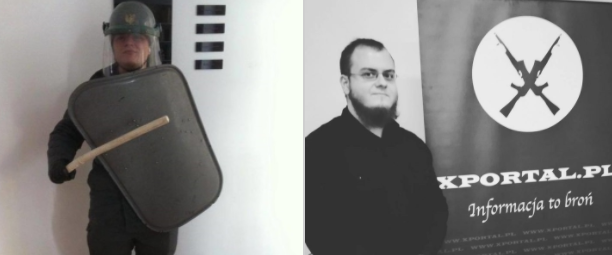The Governor of Ukraine's Zakarpattia Oblast Hennadiy Moskal told on 21 February that two Polish radicals from the right-wing extremist movement Falanga were behind the arson attempt on the "Society of Hungarian culture of Zakarpattia" which happened on 2 February 2018.
"It's Adrian Marglewski, born 01.04.1996, a resident of Krakow, and Tomasz Rafal Szimkowiak, born 24.01.1993, a resident of Bydgoszcz. Both are Polish citizens and followers of the right-wing radical organization "Falanga," members of which participated in hostilities in Donbas on the side of the militants of the so-called 'LNR' and 'DNR'," Moskal told.
According to him, the Poles made two attempts to burn down the center by throwing a Molotov cocktail, after which they left Ukraine by a bus headed to Slovakia. Luckily, only the window caught fire, and there were no victims. The next day, the Hungarian MFA appealed to the OSCE, who are permanently stationed in the conflict zone of Donbas, to monitor the situation in western Ukraine.
Zakarpattia Oblast, home to a compact Hungarian minority, has been in the epicenter of tensions between Ukraine and Hungary.

The tensions, although being high since Hungary announced it was handing out citizenship papers to ethnic Hungarians in Zakarpatia, rose to a new level when Ukraine adopted an education law in September 2017, limiting the scope of usage of minority languages in education. Directed at the de-russification of southeastern Ukraine, the initiative struck a sour note with Ukraine's western neighbors. From them, Hungary turned out to be the most discontented, claiming that the law limits the rights of its national minority. Ukraine denies these accusations. Hungary then vowed to block Ukraine's eurointegration if the law is not reverted, and has gone as far as blocking Ukraine-NATO meetings, most recently, on 9 February 2018.
Against this background, the Poles' arson attempt added fuel to the fire.
As with other ethnic provocations in Ukraine, there are good reasons to suspect there is a Kremlin connection.
According to far-right researcher Anton Shekhovtsov, "Under the leadership of Bartosz Bekier, Falanga is a part of the broad, partially coordinated pan-European extreme right movement that is, in particular, openly supportive of the Kremlin's anti-Western policies and ideas."
In 2014, Bekier traveled to Donetsk where he interviewed Denis Pushilin, the self-declared Chairman of the Supreme Soviet of the self-proclaimed Russian puppet "Donetsk People's Republic," for Falanga's website Xportal.

As well, some Falanga members were reported to fight along the "DNR" forces.

This is not the first attempt of using vandalism to promote the Kremlin's goals in Ukraine. In October 2017, after the outbreak of tensions with Hungary over the education law, Ukrainian law enforcers detained two men plotting to blow up a Hungarian monument in Zakarpattia Oblast. The men were Ukrainians who, as Ukraine's Minister of Interior claimed, were connected to two exiled former MPs of the pro-Russian Party of Regions, disbanded after its leader and Ukrainian ex-President Viktor Yanukovych fled to Russia after the Euromaidan revolution, who also fled to Russia.
Apart from the unsuccessful Hungarian monument explosion, they carried out other xenophobic attacks aiming to stir up ethnic tensions:
- in the city of Chernivtsi, where the Central Jewish synagogue was desecrated on the night of 19 November 2016, when its main facade was marked with an anti-Semitic inscription;
- in the town of Uman, where the malefactors came to the grave of Rabbi Nachman on 21 December 2016, and left the head of a pig with a carved swastika;
- in the city of Kyiv, where on 8 June 2017 the perpetrators threw a grenade at the premises of the US Embassy;
- in the city of Lviv, where on 30 June 2017 the malefactors tried to set fire to the synagogue;
- in the town of Lutsk, where on 10 July 2017 the attackers threw an explosive device at the consulate of Poland;
- in Kyiv, where on August 24, 2017, on Independence Day, a grenade was thrown at Hrushevskoho Street and the relatives of Hero of Ukraine Valeriy Chybinieiev were injured;
- in Kyiv, on Kurbasa Street, where a monument to combatants was blown up by grenades on the same day;
- in the town of Uman, where on September 21, 2017, a grenade was thrown, injuring citizens of Israel.
Russian traces have been also found in events immediatly after the attack on the Polish consulate in Lutsk: the SBU detained participants of a rally aiming to pour more oil on the fire and found connections to Russian special services. It is more than likely that Falanga's arson attempt on the Hungarian center is part of a general Kremlin strategy of destabilizing Ukraine with the help of stirring up ethnic tensions.
Read also:
- Ukraine’s law enforcers bust gang plotting to blow up Hungarian monuments
- Ukraine’s new education law unleashes international storm over minority language status
- Experts weigh in on Ukraine’s hotly debated new minority language policy
- Ukraine and Hungary both claim victory in Ukrainian education language argument
- Separatism Transcarpathian style: is Hungary aiming to grab a part of Ukraine?
- Hungary openly helping Putin destabilize Ukraine
- Spoiling Ukrainian-Polish relations: next phase in Kremlin’s hybrid war

